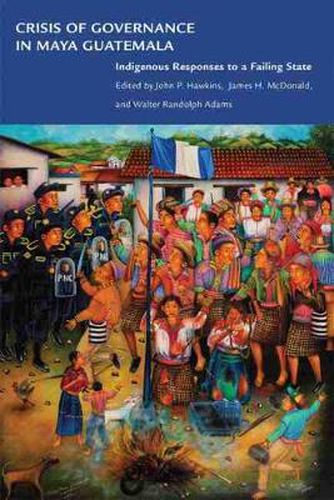Readings Newsletter
Become a Readings Member to make your shopping experience even easier.
Sign in or sign up for free!
You’re not far away from qualifying for FREE standard shipping within Australia
You’ve qualified for FREE standard shipping within Australia
The cart is loading…






The possibility of violence beneath a thin veneer of civil society is a fact of daily life for twenty-first-century Guatemalans, from field laborers to the president of the country. Crisis of Governance in Maya Guatemala explores the causes and consequences of governmental failure by focusing on life in two K'iche’ Maya communities in the country’s western highlands. The contributors to this volume, who lived among the villagers for some time, include both undergraduate students and distinguished scholars. They describe the ways Mayas struggle to survive and make sense of their lives, both within their communities and in relation to the politico-economic institutions of the nation and the world.
Since Guatemala’s thirty-six-year civil war ended in 1996, the state has been dysfunctional, the country’s economy precarious, and physical safety uncertain. The intrusion of Mexican cartels led the U.S. State Department to declare Guatemala
the epicenter of the drug threat
in Central America. Rapid cultural change, weak state governance, organized crime, pervasive corruption, and ethnic exclusion provide the backdrop for the studies in this volume.
Seven nuanced ethnographies collected here reveal the complexities of indigenous life and describe physical and cultural conflicts within and between villages, between insiders and outsiders, and between local and federal governments. Many of these essays point to a tragic irony:the communities seem largely forgotten by the government until the state seeks to capture their resources - timber, minerals, votes. Other chapters portray villages responding to criminal activity through lynch mobs and by labeling nonconformist youth as gang members. In focusing on the internal dynamics of poor, marginal communities in Guatemala, this book explores the realities of life for indigenous people on all continents who are faced with the social changes brought about by war and globalization.
$9.00 standard shipping within Australia
FREE standard shipping within Australia for orders over $100.00
Express & International shipping calculated at checkout
The possibility of violence beneath a thin veneer of civil society is a fact of daily life for twenty-first-century Guatemalans, from field laborers to the president of the country. Crisis of Governance in Maya Guatemala explores the causes and consequences of governmental failure by focusing on life in two K'iche’ Maya communities in the country’s western highlands. The contributors to this volume, who lived among the villagers for some time, include both undergraduate students and distinguished scholars. They describe the ways Mayas struggle to survive and make sense of their lives, both within their communities and in relation to the politico-economic institutions of the nation and the world.
Since Guatemala’s thirty-six-year civil war ended in 1996, the state has been dysfunctional, the country’s economy precarious, and physical safety uncertain. The intrusion of Mexican cartels led the U.S. State Department to declare Guatemala
the epicenter of the drug threat
in Central America. Rapid cultural change, weak state governance, organized crime, pervasive corruption, and ethnic exclusion provide the backdrop for the studies in this volume.
Seven nuanced ethnographies collected here reveal the complexities of indigenous life and describe physical and cultural conflicts within and between villages, between insiders and outsiders, and between local and federal governments. Many of these essays point to a tragic irony:the communities seem largely forgotten by the government until the state seeks to capture their resources - timber, minerals, votes. Other chapters portray villages responding to criminal activity through lynch mobs and by labeling nonconformist youth as gang members. In focusing on the internal dynamics of poor, marginal communities in Guatemala, this book explores the realities of life for indigenous people on all continents who are faced with the social changes brought about by war and globalization.